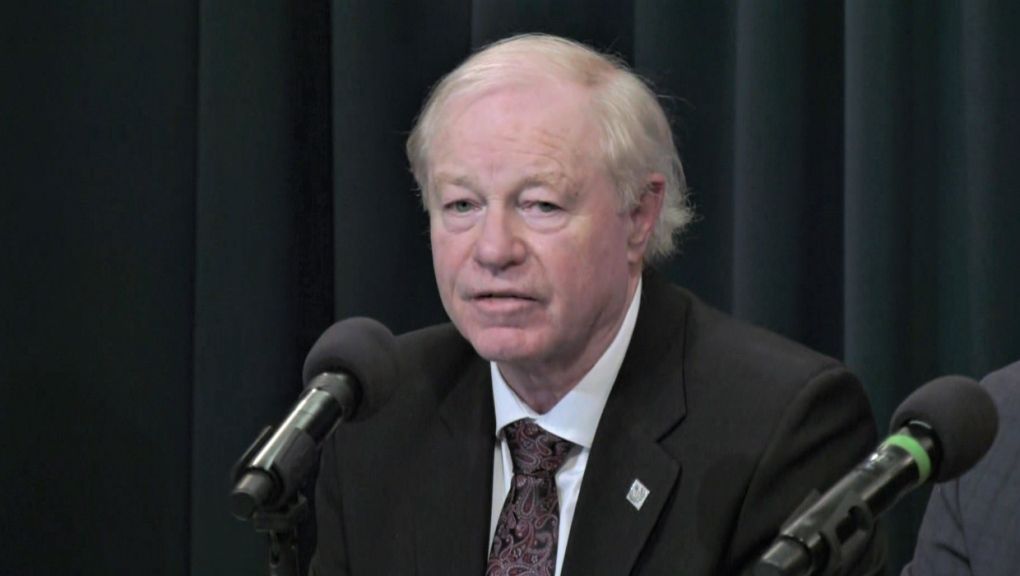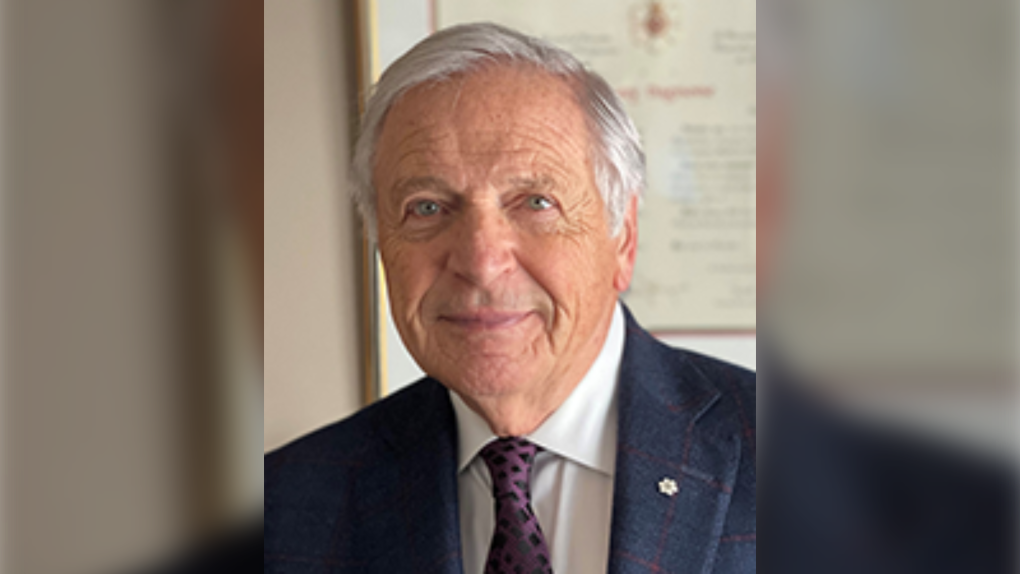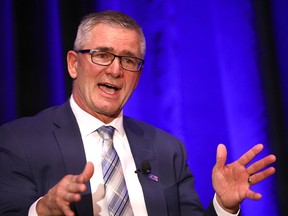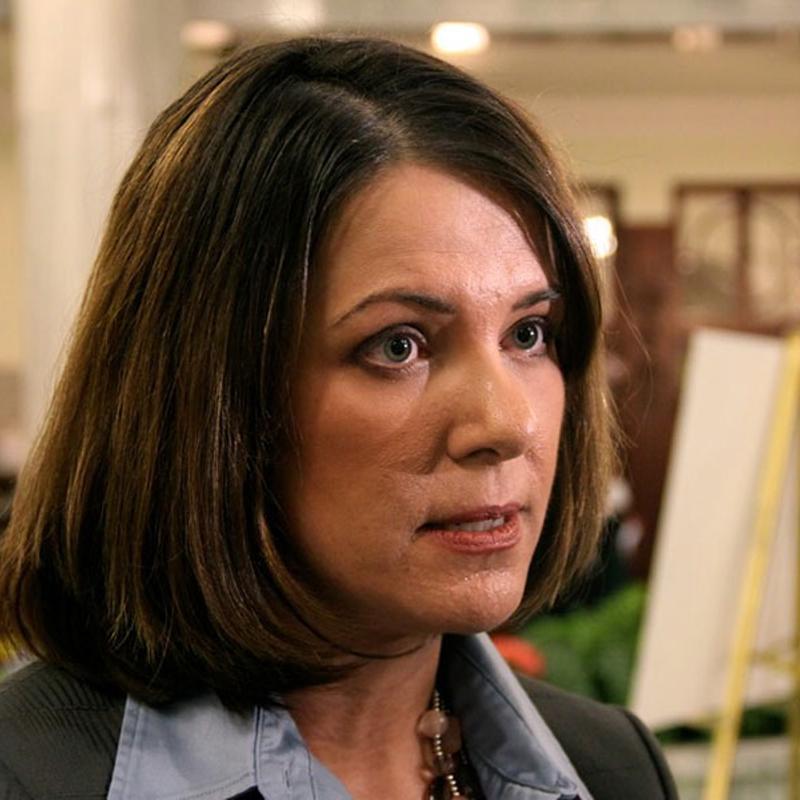'Not like health issues are going away': Experts hope Smith government listens to new top doctor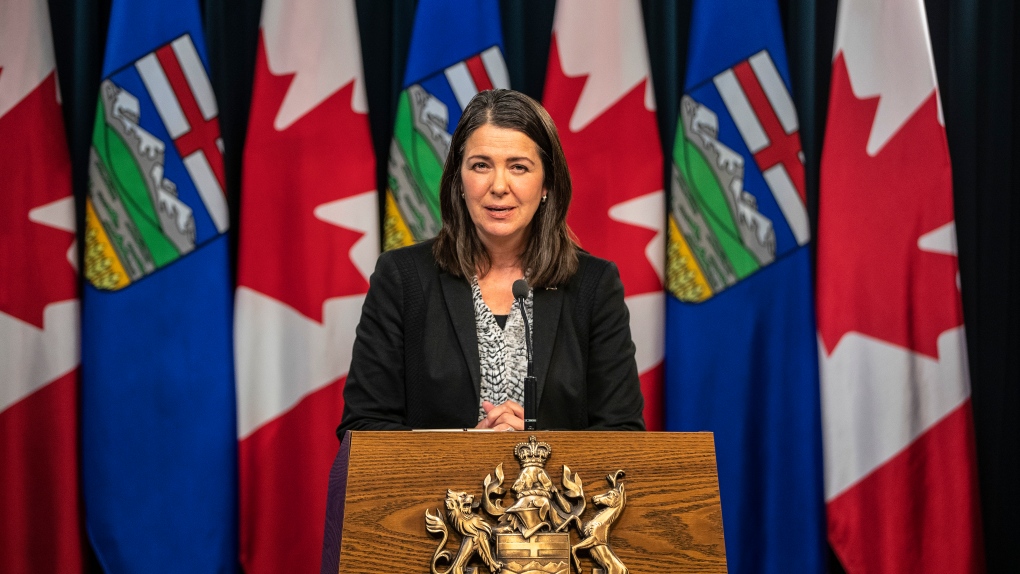
Adam Lachacz
CTVNewsEdmonton.ca Digital Producer
Published Nov. 15, 2022
Replacing Alberta's top doctor is just the tip of an iceberg of health-related items on Premier Danielle Smith's to-do list, a political scientist says.
On Monday, Smith completed a pledge made on her first day in office a month ago to replace the chief medical officer of health (CMOH), Dr. Deena Hinshaw.
Dr. Mark Joffe, an Alberta Health Services (AHS) vice president and Cancer Care Alberta medical director, was appointed interim CMOH.
Hinshaw, a public health specialist trained in Alberta, was initially lauded universally for her calm delivery of information, but in successive COVID-19 waves, became widely criticized after the province cancelled nearly all health restrictions in the summer of 2021 for the "best summer ever."
Political scientist Duane Bratt says Hinshaw was a "big lightning rod" of controversy in the province as she became the face of Alberta's response to the COVID-19.
The Mount Royal University professor sees Joffe as a stop-gap appointment while the province begins a search for the next CMOH.
"Firing people is a lot easier than hiring people," Bratt said, adding that a vetting and policy process has to be followed.
Under the Public Health Act, the province requires a CMOH.
Bratt characterized the new top doctor as an establishment choice since he is an Alberta Health Services executive and has been involved in health leadership for more than 25 years.
"Smith is a firm believer that the restrictions went too far," Bratt said. "It is striking that she is replacing Hinshaw with someone very similar and a senior executive at AHS, which Smith has also demonized."
With pediatric hospitals at or near capacity and a growing number of respiratory virus outbreaks at Alberta schools, Bratt says the CMOH will be playing a key role in guiding Alberta public health policy.
"It's not like health issues are going away," Bratt added. "There's like a dual track that's going on right now between the public statements of Smith, which are very fiery, versus what she is doing as far as government is concerned.
"We still don't know yet which side of that internal debate is going to prevail."
Dr. James Talbot, a former CMOH and University of Alberta adjunct professor in public health, believes Joffe's experience in infectious diseases will be helpful as the province grapples with influenza, COVID-19 and respiratory syncytial virus (RSV).
He just hopes the government takes Joffe's advice.
"As long as he is allowed to follow the science and his best judgement, then I think…he will work out," Talbot told CTV News Edmonton.
"It's too important not to listen to the science," he added. "When you are CMOH, you make choices that can affect up to 4.3 million people, and you don't want that done on the basis of something that somebody saw on the web, or someone was told at a party."
As Joffe takes begins his new duties, the Official Opposition is concerned he is balancing his current portfolio at AHS in addition to being the province's top doctor while hospitals are "in chaos."
"Albertans deserve so much better," said David Shepherd, NDP health critic. "Albertans deserve strong, transparent leadership that supports science and will do everything possible to ease the crisis in our health-care system."
With files from CTV News Edmonton's Saif Kaisar
Alberta health minister’s mandate from premier includes creating health spending accounts
By Caley Gibson Global News
Posted November 17, 2022 
WATCH: It's an idea the premier pitched in her leadership run which generated a lot of criticism: health spending accounts. Now it's officially part of the health minister's mandate letter. Nicole Stillger has more on the plan and what critics are saying.

Premier Danielle Smith outlined her wishes for the ministry in a mandate letter sent to the health minister earlier this week.
“Albertans are counting on us and they rightfully expect their government to address the challenges they are facing with our full attention and action,” Smith wrote.
READ MORE: Smith scraps Alberta Health Services board, installs official administrator
Other mandates outlined in her letter include working with the minister of technology and innovation to establish health spending accounts, ensuring all areas of Alberta receive prompt and efficient ambulance service and addressing health-care staffing challenges, particularly in rural areas. (See full list of expectations below).
During her UCP leadership campaign, Smith said her government would provide every Albertan with a $300 health spending account to use for health expenses not covered by Alberta Health insurance.
1:00 Alberta health minister explains dismissing AHS board and hiring administrator
Lorian Hardcastle, an associate professor in the Faculty of Law and Cumming School of Medicine at the University of Calgary, said health spending accounts are an “extremely inefficient way of trying to improve access to health services.”
“The main concern with health spending accounts is that while they may be equal in that all Albertans will get the same amount of money, health issues are not distributed equally,” she explained.
“Some people have a high income and have insurance through work and so have no problems meeting their health needs. There are then other people for whom $300 doesn’t even scratch the surface of their health needs.”
Hardcastle said it comes down to being equitable, not equal, adding there are other ways to achieve better health outcomes and better health equity for Albertans.
“We could, for example, lower the income threshold for people to qualify for public pharmaceutical benefits. We could expand eligibility to a variety of health programs. We could increase the monthly payments that we give to people with disabilities. And I think all of those things would be a better use of the same money than giving everyone $300 that they may or may not need.”
She believes the motivation behind the payments is political.
“It is politically popular to give everyone money and to tell them that they can spend it on health services as they see fit,” Hardcastle said.
“While I think it is likely to be politically popular — and so it isn’t surprising to me that this is what’s happening in an election year — that same amount of money could be much better spent elsewhere in the health-care system targeted towards actual need.”
READ MORE: Premier Smith says journey to fix Alberta health-care system will be ‘bumpy’ and ‘perilous’
Copping is to work on these things while keeping inflation and affordability in mind, Smith said.
“I know that all of our frontline workers have health spending accounts. It’s something that was important in the collective bargaining process,” Smith said at a news conference on Thursday.
“If this is something that all of our frontline workers have, we should make sure this is something all Albertans have. It’s a way of augmenting and supporting things that aren’t covered under Alberta health care.”
Smith also said plans to implement the health spending accounts will be announced in the future.
1:43 AHS says Albertans should put masks on as respiratory illness spreads
Opposition health critic David Shepherd maintains Smith’s plans for health care in Alberta will “create more chaos and hardship for all Albertans.”
“Across the province, parents and emergency room staff are crying out for support but the leader of the UCP is silent,” Shepherd said in a statement Wednesday. “Frontline health-care staff are exhausted and demoralized after years of this government’s incompetence and attacks, and all the premier has to offer is more disruption and disrespect.
“Danielle Smith, the health minister and the new interim CMOH need to get up in front of Albertans today and tell us what they are going to do to support families through this immediate crisis in children’s health care.
“It’s clear, when it comes to health care, Albertans simply can’t trust the UCP. They don’t need more chaos — they need more care.”
READ MORE: 1st statement from Alberta’s new chief medical officer of health on RSV, flu season
Smith said she expects Copping to deliver on the following commitments for Albertans:Develop a series of reforms to the health-care system that restore decision-making authority to the local level, incentivize regional innovation and competition to provide increased medical services and surgeries, and that attracts health-care professionals domestically and internationally
Assess the effectiveness of our health-care institutions including the HQCA (Health Quality Council of Alberta) and AHS and develop a plan to improve health-care delivery and health-care outcomes while managing costs. This includes mechanisms to support local decision making within AHS and supporting our frontline health-care workers
Take immediate tangible steps to have AHS improve EMS response times, decrease surgical backlogs and cut emergency room wait times
Address health-care staffing challenges, particularly in rural areas, through improving health workforce planning, evaluating retention policies, leveraging the scope of allied health professionals, streamlining immigration and certification processes, and further increasing the number of training seats for health-care professionals in Alberta. This includes fulling implementing the recently negotiated AMA (Alberta Medical Association) agreement
Support primary care as the foundation of our health-care system through assessing alternative models of care and leveraging all health-care professionals. This includes continuing the work of modernizing Alberta’s primary care system initiative, assessing alternative compensation models for family physicians and nurse practitioners, improving the management of chronic disease and increasing the number of Albertans attached to a medical home
Improve provision of care to seniors through implementing recommendations coming out of the facility-based continuing care review and the advancing palliative and end-of-life care in Alberta report. This includes continuing to add continuing care congregate spaces as well as supporting seniors to stay in their homes longer with additional supports and focus on providing appropriate home care
Work with municipalities, doctors and allied health providers to identify strategies to attract and retain health-care workers to rural Alberta
With the minister of Technology and Innovation as lead, work to establish health spending accounts, assess the inter-functionality of the 1,300 or more IT systems
Establish a task force of medical professionals under the Alberta Health Quality Council to conduct a data review of the last several years of health information with a view to offering recommendations on how to better manage a future pandemic
Work with parliamentary secretary for EMS Reform RJ Sigurdson to address EMS challenges
Work with the parliamentary secretary for Rural Health Tany Yao to address rural health challenges such as access and health-care professionals
1:57 Alberta nurses, NDP concerned about Premier Danielle Smith’s plans for health care
–With files from Paula Tran, 770 CHQR
Premier Danielle Smith fires Alberta Health Services board, appoints administrator
SHE HAS NO MANDATE, CALL AN ELECTION!
Dr. John Cowell will report to Health Minister Jason Copping
Alberta's premier spread mistruths about Alberta Health Services' handling of the COVID-19 pandemic and has a naive view of how difficult it is to recruit health-care workers, a now-fired AHS board member said.
Former senior health administrator Tony Dagnone was reacting to Alberta Premier Danielle Smith's removal of 11 AHS board members on Thursday. She has replaced them with an administrator, Dr. John Cowell, who will serve in the role for at least six months.
Dagnone, who has served as CEO of the London Health Sciences Centre in Ontario and Saskatoon's Royal University Hospital, was appointed to the AHS board in 2021.
"She seems to like shooting from the hip," Dagnone said on Thursday of Smith's decision. "She doesn't believe in being informed before making these huge, huge decisions that have an impact on the health of Albertans."
Dagnone said the board was months away from signing a new CEO to lead Alberta Health Services after the government and board removed Dr. Verna Yiu from the role in April.
Recruiting a top-notch CEO will now be far more difficult, Dagnone said.
The premier and Health Minister Jason Copping said at a press conference they chose Dr. John Cowell as a short-term administrator to allow for rapid decision making. It will allow the $15 billion organization to pivot more quickly and address multiple crises.
In 2013, Cowell served a one-year-term as AHS administrator after the Progressive Conservative government fired the board. He has also been CEO of the Health Quality Council of Alberta and a corporate leader in the private sector.
Firing AHS board was a party leadership promise
Replacing the AHS board was one of Smith's UCP leadership campaign promises. Once voted party leader in October, she said she intended to act within 90 days.
Knowing Smith's plans, one board member tendered her resignation last month.
Smith has tasked Cowell with reducing wait times impacting access to ambulances, emergency rooms and surgery. The government also wants him to consult health-care workers to devise longer-term system reforms. There are yet undisclosed milestones he must hit, in addition to writing reports within 30 days, 90 days and six months.
Copping said the government could be willing to invest additional funding to achieve those goals if Cowell recommends them.
Although critics have for years accused politicians of meddling with AHS, Smith said her goal is to quickly approve good ideas, such as a patient transfer service that could free up ambulances.
"This really is not meant to be disruptive," she said of the leadership overhaul. "Not meant to radically switch gears. It's meant to accelerate things that we already know should be implemented, can be implemented, and are underway in the pilot phase."
Cowell will report to Health Minister Jason Copping.
Unlike board members, who serve in the roles part time, Cowell will be a full-time government employee. Copping's press secretary did not answer a question on Thursday about Cowell's pay.
Cowell said he feels optimistic he has the political support necessary to make meaningful and rapid improvements.
"I really do hope that I'll be able to make an effective contribution to making health care stronger and a better experience for the patient," he said.
'There so much at stake here': outgoing board member
Smith ran for party leadership on promises of dramatic health system reforms, including firing the boards of AHS and the College of Physicians and Surgeons of Alberta. She has already replaced the province's chief medical officer of health.
Smith has said AHS failed to ensure there were enough health-care workers on the job during the COVID-19 pandemic when it required all employees to be vaccinated against the disease in late 2021.
Numbers from the organization show about 900 workers did not return to work after the vaccine mandate was lifted. AHS employs 121,000 people.
Smith has also said AHS neglected to create enough intensive care unit spaces in hospitals earlier on during the pandemic. After she was sworn in as premier, Smith said AHS "manufactured" the shortage of health-care workers.
Dagnone says that kind of rhetoric leads to some misinformed patients abusing exhausted health-care workers.
"When I witness the real stress on health-care providers and hear the premier going rogue … on public health measures, and then she resorts to criticizing AHS, someone has to step forward and really call her out," Dagnone said.
University of Calgary health law associate professor Lorian Hardcastle said switching AHS board members over time to bring in people with a mix of skills would be prudent.
"But I'm not sure this kind of dramatic change is going to be of any benefit," she said. "And in fact, I think it risks destabilizing the system."
The board's corporate memory is now lost, and Cowell will have to rapidly get up to speed, Hardcastle said.
NDP Leader Rachel Notley said the crisis in health care is due to a shortage of active health-care workers who are further demoralized and disenfranchised by the government's approach.
"The dismissal of the AHS board today is nothing short of bad political theatre," Notley said.
Smith also terminated former chief medical officer of health Dr. Deena Hinshaw this week, and replaced her with AHS vice-president Dr. Mark Joffe.
Smith said her choices thus far of known health-system leaders for key roles should reassure health-care workers that she's not looking for a drastic changes.
In 2013, former premier Alison Redford's health minister also fired the AHS board of the day after members clashed with the government over executive pay.
Four administrators, including Cowell, acted in place of a board until the NDP government appointed new members in 2015.


